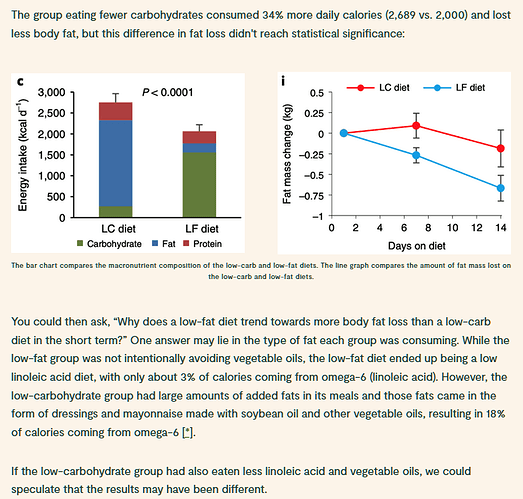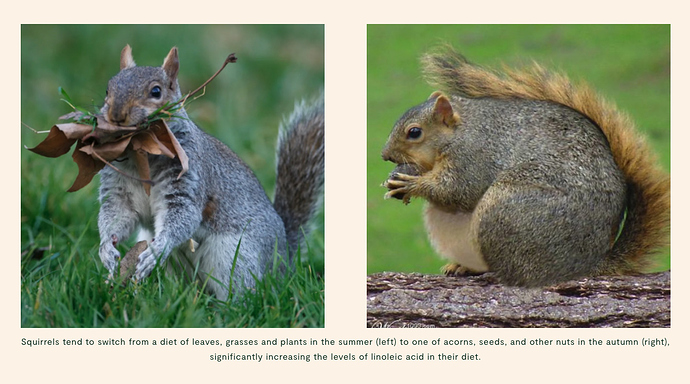I think there are some cross competing issues in the topic as it is today. In part, the attempt to find a way to ‘intelligently apply’ this to the real world of N=1 humans. That the results are at best inconsistent between people suggest that there is some other concomitant or mitigating factor that is not being addressed. I don’t think it has to mean that Petro’s stuff is inaccurate of course. Something can be valid on its own without the various frameworks built around it being equal.
Seems unrelated, and perhaps is a silly example, but: when someone finally explained lowcarb to me in a way that made it make sense to me, I decided to try it. Everyone I had talked to who tried it, had really great results with it. Including my buddy who was a Fire Dept. Captain who put his whole team on it. So I was getting excited that something might help.
I went lowcarb. Within two days I felt bad. Within four days I felt terrible. By day five I thought I was dying, and before day six arrived I had a massive flu. I went off lowcarb.
Two months later I decided to try it again. Had exactly the same experience. As well as skin eruptions like rashes as part of that, I forgot to mention.
Yeah, nobody I knew had anything but good to say about it but holy ■■■■ it didn’t work for me at all.
Years later, I was ‘lurking’ on a lowcarb forum, sadly perusing the before/after section, wishing. Off and on for a few months.
I decided to try a ‘test’… again. Because I was an incurable optimist, obviously. I did three weeks of pretty much ‘bacon and eggs, and pepperoni and cheese’ lol. And it was miraculous. And it actually cured, I mean to zero symptoms, my severe asthma, severe allergies (both medicated), severe acid reflux, adult acne, a lot of brain fog, some joint aching, mysterious rashes, and a few other things. Like all at once. Like some kind of impossible miracle.
Talk about a completely opposite response!!
It was just a trial. I had already planned to go off it. I spent a year gradually collecting pans let alone appliances – as I did not cook at all – and LC specialty ingredients I saw people using on the lowcarb forum (lowcarber.org).
One night, I woke up at like 2am and a voice (an actual voice!) told me if I did not go on that diet I was looking at online right now, I would be dead within three months. This was the closest to a religious experience I’d had in awhile. The next day I took 14 copy paper boxes of food from my house to my grandmother’s house for the family to take, and went lowcarb.
I lost 170# in a ridiculously short amount of time. Took up working out. Amazing.
Then my heart valve finally failed, which was totally unrelated and changed everything but never mind. The point is, that “eating lowcarb” had very DIFFERENT results on me the first TWO times I tried it, then it had had on anybody I knew.
Now, I think it’s because I just had so much toxic crap in my fat cells that my body was taking advantage of the growing burn of them to prioritize the bad content to get it out of me, and all of the horrible symptoms and flu and so on were part of that. But I didn’t know that. Nobody I knew had anything like that. Certainly nobody warned me about that.
So had I had a conversation about it at that point I’d have been like no man, lowcarb does not work for me at all in fact it makes me horribly sick.
So yes I realize we here do know that can happen. My point is just that it wasn’t about lowcarb or its merits, it’s that there were other factors going on with me – and it turns out some others I didn’t know, but mostly NOT with everyone I did know or hear of – that caused the result to be pretty different.
I suspect something like that is going on with the low-PUFA or focus-SFA dietary attempts. I don’t know what exactly. I just think there probably is.
PJ






 . Industrial fats have confusing chemistry. Human biochemistry and physiology seems to have many levels between the human in the environment and the human fat cell internal mechanisms complicated by each human who has reached their current state following many deliciously complex paths.
. Industrial fats have confusing chemistry. Human biochemistry and physiology seems to have many levels between the human in the environment and the human fat cell internal mechanisms complicated by each human who has reached their current state following many deliciously complex paths.